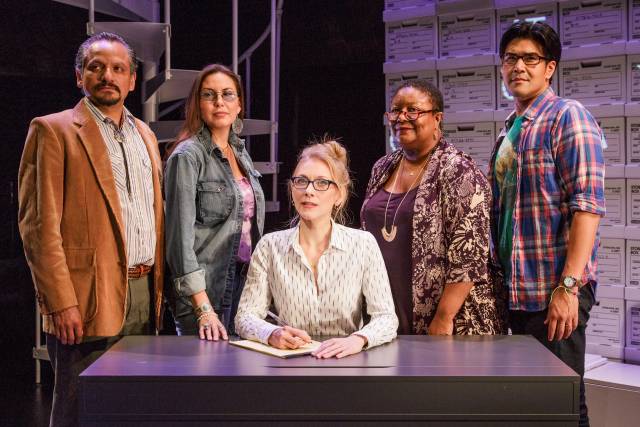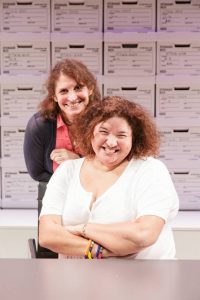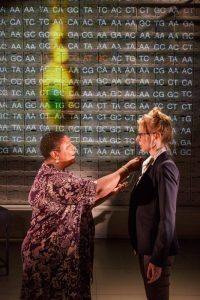

According to Deborah Zoe Laufer, being a playwright is about staring into the sun. And by that I mean asking life's biggest questions and not just expecting, but knowing that you won't come out with any definites. Laufer has become a crucial voice in theater, building a respected, globe-spanning career off of this principle.
Informed Consent, Laufer's play now onstage at The Duke on 42nd Street, was born from a commission by the Ensemble Studio Theatre and Alfred P. Sloan Foundation Science and Technology Project. The naturally curious Laufer followed her grant through genetic labs and Indian Reservations to resurrect the story of the Havasupai, who successfully sued Arizona State University in 1990 after testing was conducted on their blood with consent that was dubious at best. Pairing this legal battle alongside the fictional story of Dr. Jillian Elliot, a genetic anthropologist whose passion and scientific brilliance turns out to be a race against her diagnosis of early onset Alzheimer's, Laufer creates a profound and prescient story that questions how we define truth and identity.
I had the privilege of speaking with the playwright and teacher after seeing Informed Consent this past weekend. I'm still reeling from the provoking and enlightening show; as for Laufer, she's already chasing her next inspiration, asking new questions for her latest commission with Cincinnati Playhouse in the Park. "It's about the brain and personality. Is it a fixed thing, or are we just chemical or electrical impulses? That's what's exciting me right now." And what's exciting for Deborah Zoe Laufer is bound to be exciting for us somewhere down the road.

Could you talk a little bit about the birth of Informed Consent? I know you tend to do a lot of research for your plays, and that this was no exception.
No, this one was research heavy in more ways than I could have dreamed. It started because I ran into Lindsay Furman, and she works for the EST/Sloan Project and she said -- I ran into her at a party -- "you have four days to get a proposal in for the next commission." And I was like, oy. I went home and I went on Facebook, and I said, "guys, I need good ideas for my next science play, send me articles if you've got them." I have a really great friend who's a scientist at UPenn, and he sent me the article from the New York Times about the Havasupai, and it was, you know, it was everything that sort of fascinates me, what people believe and why, when science and religion come up against each other. So I wrote the proposal the next day, and they accepted it. So then I had to write the play (laughs). It's like, oh my gosh, what have I gotten into? And I knew I wanted to write about the genome, because I knew very little about it, and I wanted to know more.
I know that during your research process you actually spent time in labs and closely studied Native American tribes. Could you talk a little more about that? Did you find that people were open to you when you were conducting your research?
You know, when I went down to see the tribe, they've been hurt so much that the level of distrust is really high and I couldn't really get anyone to talk with me about the case. And I respected that because it's a fresh wound that they're not even beginning to heal from.
You were with the tribe that filed the lawsuit?
Yes, I was. I went to the Grand Canyon and they [the Havasupai] have a lodge down there, a 24-room lodge, and I went and stayed overnight. I went to the clinic and tried to talk to some of the nurses and doctors there, but actually getting anyone to discuss the case was pretty futile. But I got to see how dire their circumstances are down there, and there's only 600 some tribe members left, and a 50% rate of diabetes. It's kind of a desperate situation.
That really impacted the rewrites I did on the play more than anything else. I got to go to my friend's lab at UPenn and we extracted DNA from cancer cells, and I got to go to lab meetings and just sort of follow some scientists around and watch them work. Just spending a couple of days there... Mostly I was just totally jazzed about it. It was totally exciting.
I think I saw that you wrote that the best thing about being a playwright is that you get to extensively research what's on your mind and what's interesting to you.
Yeah... Yeah, I'm just fascinated by what other people do. In fields that I normally wouldn't have any window into. You don't paid well as a playwright, so that's one of the rewards. (Laughs)
You mentioned rewriting. Within all of the research you were doing, when did your story really begin to materialize? In your play, you poke fun at the idea of there being to many stories to tell and threads to follow. (The chorus chides, "Is that important to the story?" if an actor goes off on a tangent.) When did Jillian Elliot and her story of early onset Alzheimer's become your lens into telling such a layered, complex story?
Well, I wanted to have two really strong women in the play, and I knew that I needed to give each of them their own fictionalized story and not stick to exactly what had happened. I didn't want to write a bio-drama. My grandmother died of Alzheimer's, so it's always loomed really large in my family. My grandmother, my mother and I were sort of inseparable growing up, so watching her cope with that.... It's one of the things that terrifies me most.
So there's really a personal level for you.
All of my plays are mostly personal disguised as other characters. That's really what they are. So I knew I wanted to give her a problem. And this is probably more than you're interested in knowing... It's always a journey of going to a place that's most juicy and hot. So I started thinking, okay, so her grandma has Alzheimer's, then I thought, no, no, no, it should be her mother, then I thought, no, it should be early onset and she should have it, and then I thought, no, it should be early onset, she should have it and she should be afraid that her daughter has it. Cause you just want to fall in love with your characters and then put them through as much pain as you can.
So it wasn't too difficult for you to decide what to fictionalize and what to keep based firmly rooted in facts?
It was really hard. I still have very mixed feelings about it. I'm writing about a real people and I want to honor them and do them justice. So yeah, there weren't easy choices, and I still wonder if I've done everything I can to be honest and still write something meaningful and dramatic. I'm still wondering if I've done everything I should do.

Did you find, especially wrestling with issues like that, that the play has changed a lot?
Yeah, the play has changed enormously. It used to be about storytelling. I mean there used to be a choral section throughout the play. I took them out only two weeks ago. There were different parts of how my family came to this country, when I met my first love, when I had my child, hard times. And a million different people telling their stories -- about what we find universal and want we find particular. But it was cramming too much into one play, and I had to take it out. So yeah, the play has really changed until a couple of weeks ago.
You have such a talented cast, I can only imagine that once you see what they're offering and what they can do, that must help with that interaction.
Absolutely. I had nine workshops of this play. Which is probably seven too many, (laughing) and I write for whatever cast I'm with. I mean, if I'm brought in to be part of the rehearsal process for a ten year old play, I'll rewrite it for the cast that's in front of me. And I'm afraid that was not the best way to develop a play, because I just rewrote for whatever cast I was with along the way. So I have to go, okay, this is it, this is the production and I'm going to have to be done with it.
You make it pretty clear that you, as a playwright, don't want to take sides or offer easy answers in your plays, but as you write and develop your work do you ever find yourself forming strong opinions about the issues that you write about one way or another?
I am sort of in love with what science can tell us and my heart is really... I'm always on the side of more and more research, more and more learning, curiosity, finding things out. This play, it really confounded me, because the deeper I got into it, the more I recognized the tribe's pain and it really did shift for me.
My viewpoint always is shifting back and forth, and I always come away with, in every play I've written, more questions than answers. Or it's just not a particularly interesting play to me. I have to start out with a subject that I know will be so complicated I'll never be able to unwind it all.
Is that what you hope to provoke in your audiences -- a sense of questioning? A dialogue?
I'm finding more and more that my impulse to write is the impulse I had as a little kid, which was coming home from school and wanting to tell my mom everything that I had learned that day. Like, you will NOT believe this! I read things that just blow my mind or fascinate me, and I just want to tell everybody. It's what I tell my students. A play is sort of your letter to the world, it's a very small world because not that many people see plays, but it's my chance to tell a story and say to people, isn't this incredible? What do you think? It's not really my place -- I'm no better qualified to form an opinion than anyone else, so all I want is to share what I'm seeing with people.
Your play wrestles with what is perhaps an inherent tension between scientific truth and the truth that we create through art or fiction or religion. What is the ideal marriage between the two entities? Do we need more interaction between the two worlds?
What I go to the theater for is to find out what it means to be human. It is my place of worship if that's what you want to call it. When theater moves me to the core, it's because it makes me see humanity in a new light and question my preconceptions. I want my preconceptions and my biases to be challenged all the time or I will become complacent and... dull! (Laughs)
Right now scientific breakthroughs are so thrilling and happening so fast, and it's just going to become faster and faster that I feel like as a society, to keep up with what is possible and how it will impact us and change us as humans, the choices that we're going to have to make, it just needs constant examination. It's just a thrilling time to be alive. All the big questions, I think that's what theater is there for. To ask all of the big questions about what it is to be human now.
Informed Consent continues its run at The Duke on 42nd Street through September 13.